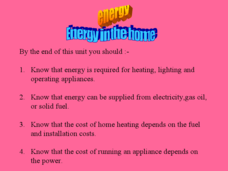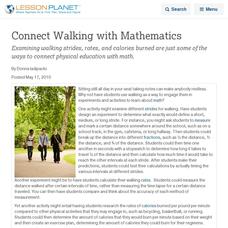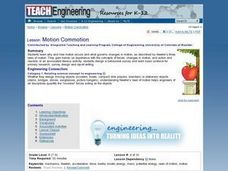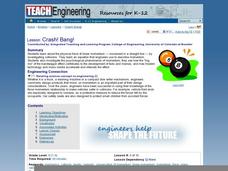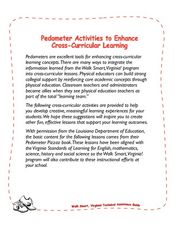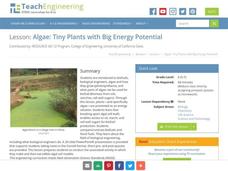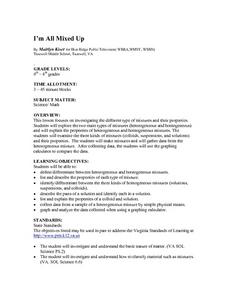Curated OER
Energy in the Home
This PowerPoint covers the complete topic of using energy in the home. Facts are given about the requirements for energy, where energy comes from, costs of energy and costs of running appliances. There are a number of lists here that...
Curated OER
Atlatl Lessons Grades 4-12
Students examine motion and how to describe it qualitatively. In this investigative lesson plan students see how aboriginal people were environmentally responsible.
Curated OER
Wingin' It
Learners investigate the physics of flight by creating an airfoil. In this physics lesson, students create an airplane wing from copy paper, cardboard, bamboo skewers and other classroom items. Learners compete with their...
Curated OER
Invisible Rays
Students explore physical science by completing a lab assignment. In this sunlight instructional activity, students define a list of scientific vocabulary terms and complete fill in the blank questions. Students conduct a photographic...
Curated OER
Connect Walking with Mathematics
Examining walking strides, rates, and calories burned are just some of the ways to connect physical education with math.
Curated OER
Science: Motion Commotion
Young scholars examine Newton's three laws of motion to discover what causes it and how it changes. They conduct motion experiments by building catapults and constructing balloon rockets. Finally, they conduct peer studies correlating...
Curated OER
Crash! Bang!
Students study the physical force of linear momentum by investigating collisions. They analyze the difference between elastic and inelastic collisions. They calculate linear momentum.
Curated OER
Sounds Good to Me
Students determine density and hardness of wood samples based on several investigations. In this physical science and music lesson, students visit four centers and perform tests on wood samples to determine densities and hardnesses. They...
Curated OER
Vernier - A Speedy Slide with EasyData™ App and CBR 2™
Mathematicians use a CBR 2™ motion detector to determine their speed or velocity going down a playground slide. They also experiment with different ways to increase their speed going down the slide. Finally, students complete the Student...
Curated OER
Pedometer Activities to Enhance Cross-curricular Learning
Young scholars complete different activities involving pedometers such as writing a creative story, calculating step averages, researching pedometers, calculating calories, and much more.
Curated OER
Frisbee Baseball
Students keep track of the number of tosses it takes them to reach each base, and encourage team members and recognize their successes. To make this activity fit the level of older classes, measure distances and figure averages as you play!
Curated OER
The "Wright" Puzzle
A crossword puzzle based on the lives of the Wright brothers. Students research on their own or in small groups several brief biographies of the Wright brothers.They complete a crossword puzzle based on their reading.
Natinal Math + Science Initative
Slope Investigation
Context is the key to understanding slope. A real-world application of slope uses a weight loss scenario with a constant rate of change to introduce the concept of slope of a line, before it makes a connection to the ordered pairs...
University of Colorado
Modeling Sizes of Planets
The density of the huge planet of Saturn is 0.7 g/cm3, which means it could float in water! In the second part of 22, science pupils explore the size and order of the planets. They then calculate weight and/or gravity and density of...
Curated OER
Action-Reaction! Rocket
Students construct a rocket from a balloon propelled along a guide string. They use this model to learn about Newton's three laws of motion, examining the effect of different forces on the motion of the rocket. They measure the distance...
Curated OER
H2O to Go to Go
Youngsters engage in a relay race where they dip a sponge in water, run to a bucket, and squeeze out the sponge. They have five minutes to take turns transporting water to the goal. Whey the time is up, each team measures the total...
Teach Engineering
May the Force Be with You: Weight
Too much material will weigh you down. The sixth segment in a series of 22 highlights how weight affects a plane. Pupils learn that engineers take the properties of materials, including weight, when designing something.
Teach Engineering
Algae: Tiny Plants with Big Energy Potential
My, what big energy potential you have! Scholars learn about the energy potential of using algae as a biofuel. A PowerPoint presentation first describes the structure of algae and then how researchers use algae as biofuel to produce energy.
Curated OER
Sphere Dressing
Geometric design makes a fashion statement! Challenge learners to design a hat to fit a Styrofoam model. Specifications are clear and pupils use concepts related to three-dimensional objects including volume of irregular shapes and...
Polar Trec
Down to the Deep Virtual Lab
At a depth of 3,000 m in the ocean, the pressure is 300 times that at sea level! In the activity, individuals predict what will happen to Styrofoam cups submerged 3,000 meters into the ocean. They then convert these units to soccer...
Curated OER
Put Your Truss in Building Bridges
Students apply abstract concepts, such as stress, fulcrums, the law of gravity, and the strength of different geometric shapes. Groups of student contractors operate simulated architectural firms to create strong, economical bridges.
Curated OER
CO2 and You
Students study the scientific evidence about carbon dioxide emissions. They learn to calculate the amount of energy used by different appliances. They complete a worksheet which analyzes the amount of energy that their home uses.
American Statistical Association
Exploring Geometric Probabilities with Buffon’s Coin Problem
Scholars create and perform experiments attempting to answer Buffon's Coin problem. They discover the relationships between geometry and probability, empirical and theoretical probabilities, and area of a circle and square.
Curated OER
I'm All Mixed Up
Middle school scientists compare and contrast heterogeneous and homogeneous mixtures. They differentiate solutions, colloids, and suspensions by examining samples of each. Note that the bulk of the lesson plan directs you how to...
